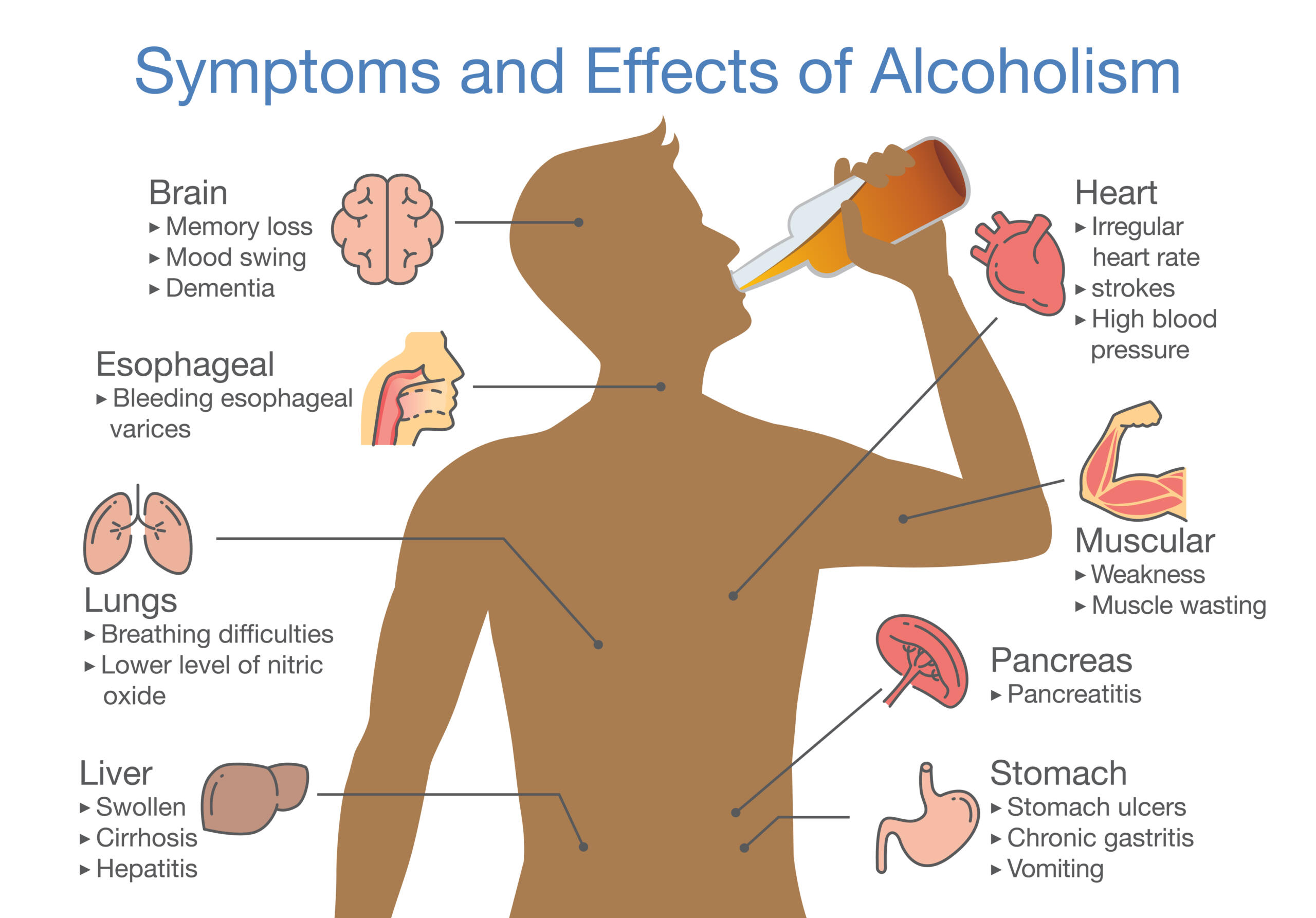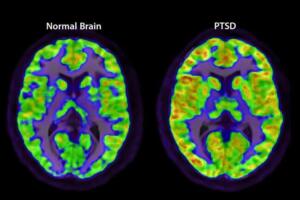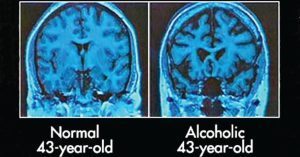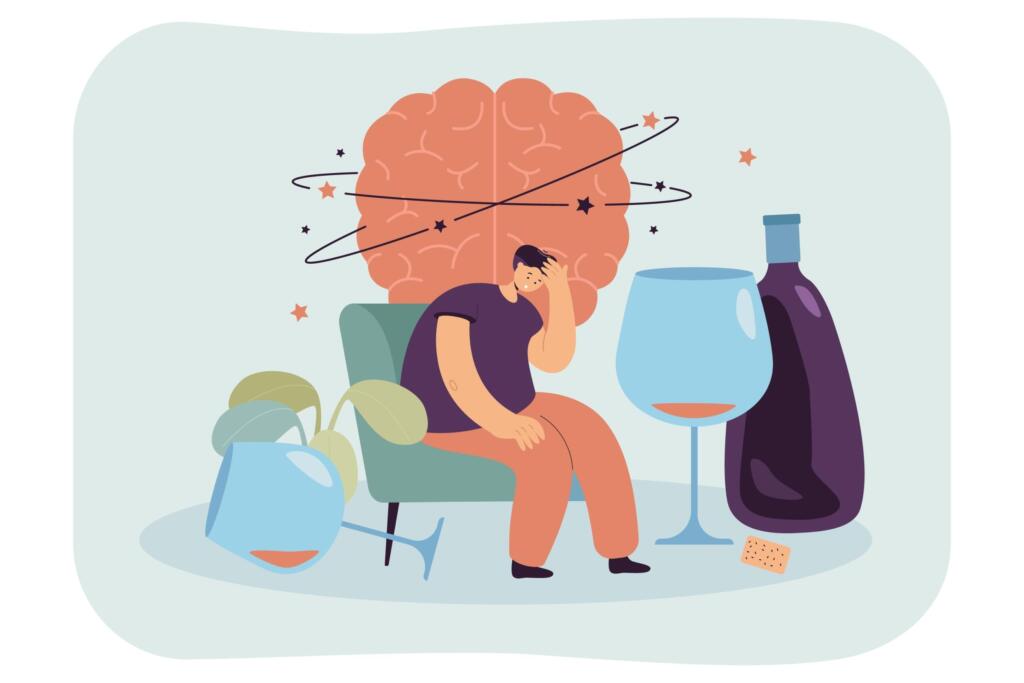Alcoholism is a condition that compels you to continue drinking to excess despite the significant problems and damage it causes to your life, health, and relationships. It is important to remember that the term “alcoholism” can be prejudiced and may lead to stigma around people who drink too much or are addicted to alcohol.
Physical Symptoms
General worsening health is almost universal for alcoholics. Drinking excessively impacts the brain, heart, digestive system, liver, lungs, and pancreas.
Outwardly, the most common physical signs are:
Withdrawal symptoms when you stop drinking alcohol. These include shaking, DTs (Delerium Tremens), nausea, headaches, sweating, insomnia, and seizures.
Looking unkempt, pale, listless, and with poor personal hygiene. Alcoholics tend to take less care of their physical appearance and health. They may also look exhausted and drained due to insomnia and withdrawal.
Injuries such as frequent unexplained bruises, cuts, and scratches are common. This is due to disorientation while extremely drunk. Furthermore, many people engage in or are victims of violence while drinking heavily.
Red or yellow skin. These are separate issues. Yellow suggests jaundice from liver problems, while ruddy and often shiny redness (particularly in the nose and cheeks) is caused by circulation problems.
Lifestyle Symptoms
The social and lifestyle symptoms of alcoholism are often obvious to those around us. Many recovered alcoholics are surprised to find that many friends and family are already aware.
Can’t control your drinking. This is the main symptom of alcoholism. When someone asks us if they might be an alcoholic, we suggest: stop drinking. If you can’t stop drinking for a few months without relapse and have withdrawal symptoms, then yes, you are probably an alcoholic.
No interest in life. Losing interest in important things in life such as family, friends, hobbies, or work. Alcohol addiction takes over, leaving little room for other activities that used to make you happy.
Behaving differently. A new drinking-based social group, heavy spending, borrowing, or stealing money. Functioning with an alcohol problem means letting something slide, and often it is relationships and finances that take the hit.

What are the causes of alcoholism?
The causes of alcoholism have been investigated and studied for many years. As a result, it has provided the addiction treatment world with much-needed information and understanding of how to treat alcoholism effectively.
Whilst there is no way of predicting who will develop a problem (there is still so much that is not fully understood), certain people will be more predisposed.
In this article, we look at the common causes of alcoholism, how it develops, and, most importantly, how it can be treated using evidence-based treatments.
At Rehab Guide, we specialise in the successful treatment of addiction. We achieve this by professionally treating the factor that caused the condition and showing our patients how to live a life free from alcohol.
What defines an alcoholic?
No one sets out to be an alcoholic; neither do they factor it into their life plan.
Whilst most people can easily control their drinking, for some, this is impossible.
Why certain individuals develop a drinking problem is still a bit of a mystery. However, the National Institute of Alcohol Abuse and Alcoholism has identified some common underlying contributing factors in those who suffer.
The common factors include:
Genetics – If there is a history of alcoholism or mental health illness in the family, a person’s brain and body could be more genetically susceptible to developing alcohol dependence. 1
Environmental factors – A person who is regularly exposed to alcohol (i.e. through family or lifestyle) or has been raised in a dysfunctional manner by their primary caretakers may also be more susceptible to developing alcoholism. 2
Trauma – Trauma, especially when experienced whilst the brain is still developing during childhood and teenage years, can cause lasting damage to several highly important parts of the brain, one of which is the brain’s limbic system.

PTSD – Post Traumatic Stress Disorder results from unresolved trauma and produces significant & lasting damage to the brain.
The limbic system part of the brain controls impulse and emotions. It is also responsible for laying down and forming memories. Unresolved trauma can leave a person in a heightened state of fight or flight, and this can lead them to seek an alternative way to calm unmanageable emotions – drinking and drugs being a prime example 1
Mental health – Mental health problems unbalance the brain’s chemistry and can often lead to self-medication through substance abuse, especially if the correct treatment is not promptly sought and received.
History of drug and alcohol use – Although a person can potentially develop the disease at any point in their life, it is much more likely in a person who frequently abused alcohol during their teenage and young adulthood years. 2
Heavy drinking/binge drinking during teenage years can seriously impact brain health and growth. These changes can be lasting and lead on to a drinking problem if not treated.
Whilst the brain is still in its developmental stage, it is particularly vulnerable to damage caused by exposure to chemical substances. Those who suffer from addiction usually (but not always) start using alcohol and drugs regularly throughout their developmental years.
| Contrary to the belief that the brain is fully mature once a person reaches adulthood (aged 18), the human brain continues to develop until the age of 25. 3. |
The longer an individual has suffered from addiction, the more challenging and complex the problem is to treat. This is why it is so important to seek help for an alcohol problem sooner rather than later. Alcoholism is a progressive disease of the brain; without treatment, the brain and body only ever suffer further deterioration.
Understanding and accepting alcoholism
For the person who is suffering, the whys are not so important. A person can get caught up in the reasons why they became alcoholic, and this can become a justification, as opposed to a treatable explanation.
It is important if you or a loved one suffer from a drinking problem to understand the nature of alcoholism. It is not only the family and loved ones that question why an individual suffering from an alcoholic problem repeats the same mistakes over and over but the sufferer also. They are often equally as baffled by their own behaviour and inability to exert willpower as far as alcohol is concerned.

Brain scans and numerous scientific and medical studies have shown that alcoholism is a chronic and progressive disorder of the brain, characterised by relapse and compulsive drinking despite adverse consequences to physical, emotional, social and occupational health 1
Over time and with repeated exposure to excessive alcohol intake, the brain’s tissues deteriorate and die. The dopamine reward centre also stops functioning as it should, and the brain’s metabolic rate is significantly slower than that of a healthy brain.
Many areas of the brain become chemically damaged, causing the brain to rewire itself to seek and drink alcohol compulsively. This is due to the brain reprioritising alcohol as the primary source of dopamine release and to support alcohol dependence.
With this understanding, accepting that the person suffering is not at fault can be easier. However, they are still responsible for seeking and accessing the correct treatment.
In an individual who is extremely mentally and physically unwell, the family may need to intervene with the assistance of professional intervention.
Risk Factors for Alcoholism
There are a few groups who are more likely to be alcoholics.
Genetics – If there is a history of alcoholism or mental health illness in the family, a person’s brain and body are more likely to experience alcohol dependence.
Environmental – A person who spends time around alcohol (i.e. through family or lifestyle) is more likely to suffer from alcoholism.
Trauma – Especially when the brain is still developing during childhood and teenage years, trauma can cause lasting damage to several highly important parts of the brain. It is common for people with trauma to use alcohol as a type of self-medication.
Mental health – Mental health problems unbalance the brain’s chemistry and can often lead to self-medication with alcohol. The correct treatment and counselling will help.
History of drug and alcohol use – Although a person can develop alcoholism at any point, it is much more likely if they have had it before.
The longer you suffer from addiction, the harder it is to treat. This is why it is so important to get help for an alcohol problem sooner rather than later.
Accepting Alcoholism
For the person who is suffering, the whys are not so important. A person can get caught up in why they became an alcoholic. This can become a justification instead of a symptom.
The same issue comes up for friends and family. You may have spotted the symptoms of alcoholism but can you accept them as symptoms of an illness? This is an important part of supporting a loved one in alcohol rehab.
There are some important things to remember if you have a loved one in alcohol rehab:
Alcoholism affects your brain. Scientific and medical studies show that alcoholism changes how your brain works. The brain controls your thoughts and actions. Alcohol interferes with the signals your brain sends and receives. So it is no surprise that an alcoholic’s behaviour seems confusing.
Over time, drinking too much causes the brain to change the chemicals it produces. The reward centre also stops working correctly, and the brain’s metabolism slows down. This can be fixed through abstinence and treatment.
Denial comes from fear. One of the most infuriating parts of helping a loved one with alcoholism is denial. This includes denying the alcoholism, the effect it has on those around you, and even actions done while drunk. Remind yourself constantly that the person is protecting themself from a painful truth, not being cruel to you.
Half of alcoholics have mental health conditions. It is likely that someone with alcoholism has been using drinking to self-soothe physical or mental problems. A diagnosis in rehab and counselling will help to treat this common problem.
With this understanding, it can be easier to accept that the person suffering is not at fault. They are, however, still responsible for seeking and accessing the correct treatment.

Treating Alcoholism
Just as a person with diabetes or depression cannot think themselves better, an alcoholic cannot recover without treatment.
This needs to be bespoke. Each of us will have varying treatment needs. There is no one size fits all for treating addiction. Treatment plans should factor in medical, psychological, emotional, educational, and social treatment needs.
At Rehab Guide, we successfully treat all forms of addiction disorders. Treatments are delivered in stages within our residential rehab clinics and delivered in the following order for success.
Medical Alcohol Detox
Those with alcoholism must stop drinking safely and comfortably before undergoing treatment. We achieve this by providing medical detox with 24/7 assistance and monitoring.
Medical detox involves replacing alcohol with prescribed medication. The medication is then gently tapered off over a period of days until it is safe to stop. This process ensures that safety comes first. Detoxing from alcohol can cause life-threatening withdrawal symptoms if not medically managed.
Intensive Treatment Plan
Once the alcohol has been safely stopped, the brain needs to recover too. Sadly detox is not enough to treat alcoholism. With the brain remaining in the same damaged state, relapse is likely.
Rehabilitation programmes cover all areas of the person’s life that have been affected by their alcohol abuse. These include day-to-day living, occupation, relationships, socialising, and coping with emotions.
With alcohol out of the equation, a person suffering from alcoholism will need to learn how to live an alcohol-free life, which is something that does not come naturally or automatically.
The outcome of undergoing one of our intensive rehabilitation programmes is learning healthy and effective coping mechanisms and strategies. You also have the latest in relapse prevention techniques to heal and adopt a programme that will support your recovery.

Aftercare and Sober Living Accommodation
Aftercare is an important part of recovery. Attending support groups helps you connect with others in a similar situation. You can share your thoughts and feelings without worrying about judgment.
You should see a qualified alcohol counsellor regularly. This will improve your mental health and quality of life. Sober living accommodation is available too. If you are not ready to return home or think there is a risk of relapse, this is a great option.
We also ensure all of our clients are introduced to local alcohol support networks back home. We continue to support them and their families once inpatient rehab treatment is finished.
For more information on how we at Rehab Guide offer effective bespoke treatment, please call 02072052845 and speak to a member of our team today.
Sources:
- National Institute of Alcohol Abuse and Alcoholism. Alcohol use disorders. https://www.niaaa.nih.gov/alcohol-health/overview-alcohol-consumption/alcohol-use-disorders
- Family, social and individual factors contributing to the risk of adolescent substance use. NCBI. https://www.ncbi.nlm.nih.gov/pmc/articles/PMC4008086/
- Maturation of the adolescent brain https://www.ncbi.nlm.nih.gov/pmc/articles/PMC3621648/
Jason has been writing expert articles and blog posts on issues related to addiction and mental health for Rehab Guide.
Jason has a BA in Psychology, a Masters of Social Work and is currently working on his doctorate in social work.


